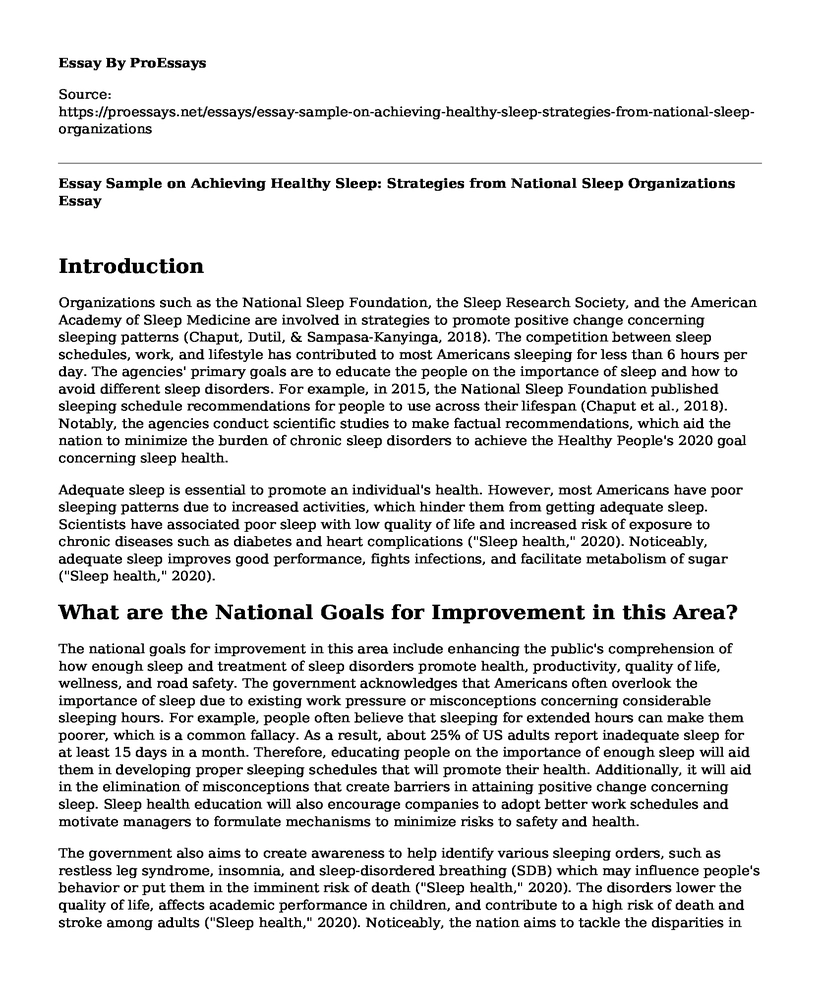Introduction
Organizations such as the National Sleep Foundation, the Sleep Research Society, and the American Academy of Sleep Medicine are involved in strategies to promote positive change concerning sleeping patterns (Chaput, Dutil, & Sampasa-Kanyinga, 2018). The competition between sleep schedules, work, and lifestyle has contributed to most Americans sleeping for less than 6 hours per day. The agencies' primary goals are to educate the people on the importance of sleep and how to avoid different sleep disorders. For example, in 2015, the National Sleep Foundation published sleeping schedule recommendations for people to use across their lifespan (Chaput et al., 2018). Notably, the agencies conduct scientific studies to make factual recommendations, which aid the nation to minimize the burden of chronic sleep disorders to achieve the Healthy People's 2020 goal concerning sleep health.
Adequate sleep is essential to promote an individual's health. However, most Americans have poor sleeping patterns due to increased activities, which hinder them from getting adequate sleep. Scientists have associated poor sleep with low quality of life and increased risk of exposure to chronic diseases such as diabetes and heart complications ("Sleep health," 2020). Noticeably, adequate sleep improves good performance, fights infections, and facilitate metabolism of sugar ("Sleep health," 2020).
What are the National Goals for Improvement in this Area?
The national goals for improvement in this area include enhancing the public's comprehension of how enough sleep and treatment of sleep disorders promote health, productivity, quality of life, wellness, and road safety. The government acknowledges that Americans often overlook the importance of sleep due to existing work pressure or misconceptions concerning considerable sleeping hours. For example, people often believe that sleeping for extended hours can make them poorer, which is a common fallacy. As a result, about 25% of US adults report inadequate sleep for at least 15 days in a month. Therefore, educating people on the importance of enough sleep will aid them in developing proper sleeping schedules that will promote their health. Additionally, it will aid in the elimination of misconceptions that create barriers in attaining positive change concerning sleep. Sleep health education will also encourage companies to adopt better work schedules and motivate managers to formulate mechanisms to minimize risks to safety and health.
The government also aims to create awareness to help identify various sleeping orders, such as restless leg syndrome, insomnia, and sleep-disordered breathing (SDB) which may influence people's behavior or put them in the imminent risk of death ("Sleep health," 2020). The disorders lower the quality of life, affects academic performance in children, and contribute to a high risk of death and stroke among adults ("Sleep health," 2020). Noticeably, the nation aims to tackle the disparities in sleep health among people of different ages, education, social-economic status, or races.
How is the State of Florida Doing in Meeting this Goal?
The state of Florida has implemented strategies such as creating sleep awareness to promote positive change concerning sleep health. For example, in 2019, Florida's governor, Ron DeSantis, declared October to be a Sleep Awareness Month through a state proclamation. The awareness initiative aimed at informing caregivers and parents on the benefits of sleep, especially on infants. The state acknowledged that sleep-related causes such as sudden infant death and suffocation can be avoided through the proper sleeping education. Moreover, it provides people with methods to create suitable work-sleep schedules to promote their health. Additionally, the state collaborates with the national government to implement strategies that aid in promoting positive change among its citizens.
References
Chaput, J. P., Dutil, C., & Sampasa-Kanyinga, H. (2018). Sleeping hours: what is the ideal number and how does age impact this? Nature and Science of Sleep, 10, 421-430. DOI:10.2147/NSS.S163071
Sleep health. (2020). Retrieved from https://www.healthypeople.gov/2020/topics-objectives/topic/sleep-health
Cite this page
Essay Sample on Achieving Healthy Sleep: Strategies from National Sleep Organizations. (2023, Mar 27). Retrieved from https://proessays.net/essays/essay-sample-on-achieving-healthy-sleep-strategies-from-national-sleep-organizations
If you are the original author of this essay and no longer wish to have it published on the ProEssays website, please click below to request its removal:
- Paper Example on Pathophysiological Mechanisms of Anemic Disorders
- Essay Sample on Myocardial Infarction: Causes, Effects & Treatment
- My Journey to Becoming a Pediatric Nurse Practitioner - Essay Sample
- Essay Example on Privatizing Child Welfare: Exploring CBC for Foster Children in Florida
- Essay Sample on Elderly Pain Management: Essential for Quality Life
- Essay Example on World Population: Characteristics of Women Population
- Abortion - Free Essay Example







